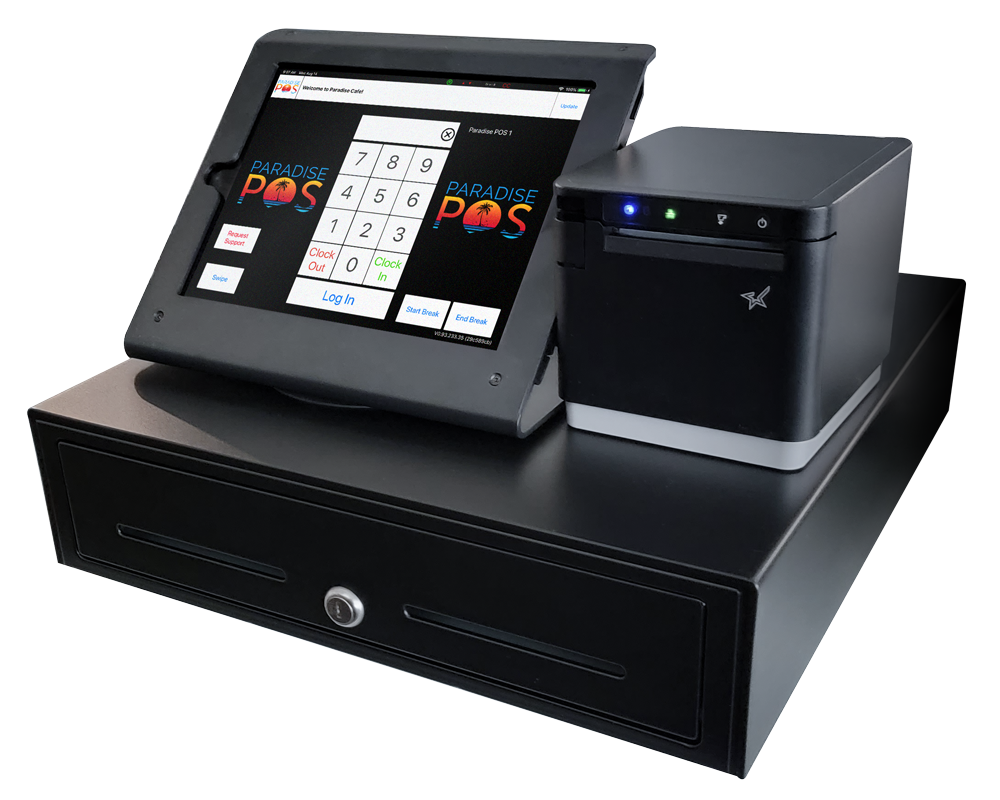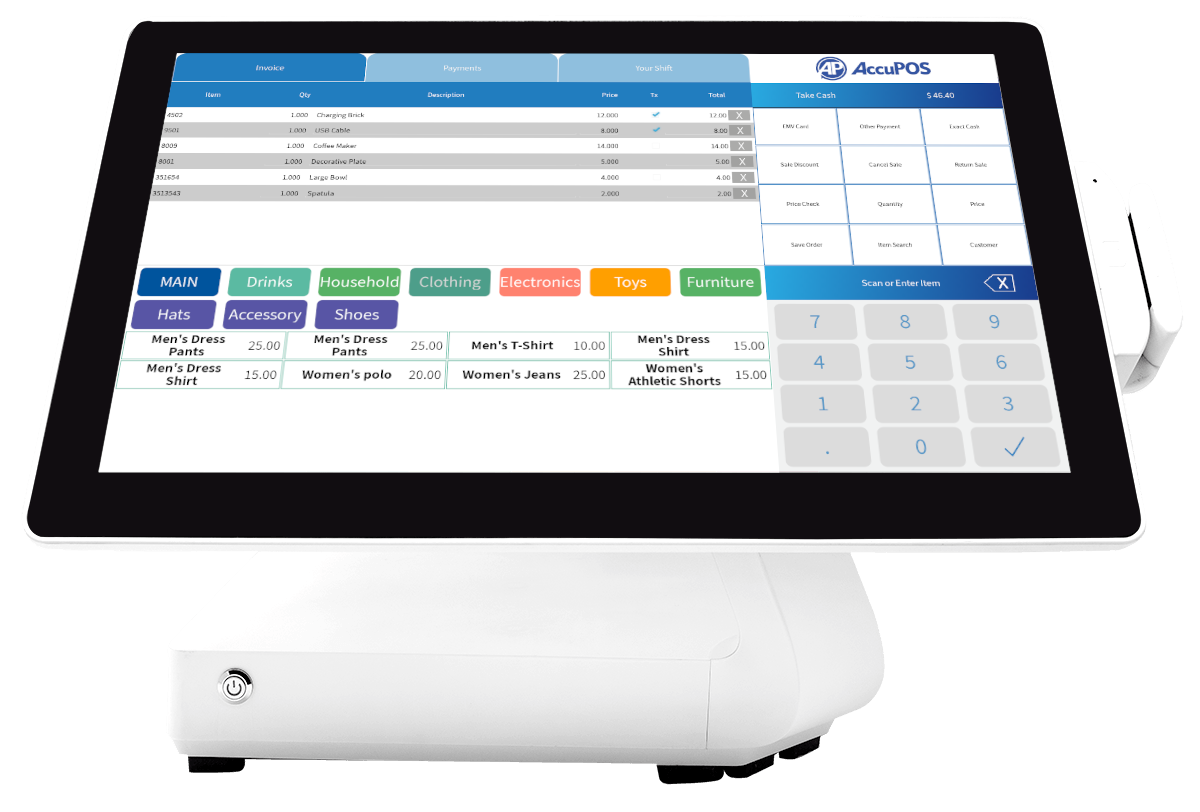Fascination About Pos System For Small Business
Fascination About Pos System For Small Business
Blog Article
Rumored Buzz on Pos Machine

POS Machine: Retail Point-Of-Sale Solutions Streamline Deals
How Pos Systems can Save You Time, Stress, and Money.

Hardware Parts of a Point of Sale System What makes a POS system tick? It's not just software; the hardware plays a starring function. Think about it as the body to the software application's brain. Without the best hardware, even the most sophisticated POS software is just a quite face. Essential POS Hardware So, what are the must-haves? Let's simplify. The main processing system, frequently a computer system or tablet, is the heart of the operation. The display or touchscreen show permits staff to interact with the system. A barcode scanner speeds up the checkout process. Keep in mind the days of manually getting in each code? The dependable receipt printer offers customers with a record of website their purchase. A money drawer keeps your cash safe and organized. A card reader enables customers to pay with credit or debit cards. Diving Deeper: Beyond the Basics However wait, there's more! Depending upon your company, you might require specific hardware. For example, a restaurant might incorporate kitchen printers to relay orders, while a retail store might use label printers for item tagging. Ever question how your local bakeshop quickly prints those delicious-looking labels? Choosing the Right Hardware: A Balancing Act Selecting the ideal hardware isn't simply about buying the most costly devices. It's about finding the sweet spot between functionality, sturdiness, and budget plan. A small company just starting might opt for a more basic setup, while a high-volume merchant will require robust, high-performance machines. Is it much better to purchase brand-new or used? Consider your alternatives carefully. A brand-new system offers the most recent technology and service warranty protection, however a reconditioned system can conserve you money. The Future of POS Hardware What does the future hold? Anticipate to see a lot more integration with mobile devices, biometric scanners for employee authentication, and advanced analytics dashboards displayed on bigger, clearer screens. Picture a world where inventory is automatically upgraded in real-time as products are scanned-- a world where you can track your very popular product from anywhere in the world. The possibilities are endless, and the hardware is continuously developing to meet the needs of today's companies. Are you prepared to upgrade your point of sale system?
Software Features and Capabilities: The Heart of Your POS System
Ever watch an experienced barista glide through a hectic early morning rush? Their secret isn't just caffeine; it's a seamless dance with their POS system. The software application is the conductor of your organization symphony, managing whatever from sales to stock. What notes should you be listening for? What capabilities genuinely matter in today's market?
Stock Management: Beyond Counting Beans
Forget spreadsheets that haunt your dreams. Modern POS systems offer real-time inventory tracking, alerting you when your stock of artisanal coffee beans dips precariously low. Think about it as a digital guardian angel, avoiding those uncomfortable "Sorry, we're out!" minutes to consumers. What if you could likewise anticipate need based on historic data? Many systems now offer forecasting tools, an effective weapon versus overstocking and lost sales. This assists prevent the dilemma of lacking popular products or collecting excess stock of slow-moving products, both of which can constrain cash circulation and area.
Sales Reporting and Analytics: Decoding the Information
Sales information is the new gold, and your POS system is the miner. Forget just knowing just how much you sold today. Dive deep into the information to reveal trends, identify your very popular products, and comprehend customer habits. Which menu product sets completely with the day-to-day special? Which promo resonated most with your clientele? These insights are not simply interesting; they're actionable intelligence. Without dependable sales reporting, browsing the intricacies of service decision-making becomes like sailing without a compass, increasing the opportunity of errors and missed out on chances.
Customer Relationship Management (CRM): Building Bridges, Not Walls
Remembering a regular client's name and preferred order is charming, but scaling that individual touch is difficult. POS systems with CRM capabilities permit you to track consumer purchase history, choices, and even birthdays. Picture instantly offering a discount on their birthday-- a little gesture that cultivates loyalty and encourages repeat company. However there is the prospective snag of bad data quality, which can result in unreliable customer profiles and ineffective marketing efforts.
Payment Processing: Simplifying the Transaction
The checkout experience can make or break a sale. Seamless integration with various payment techniques-- credit cards, mobile wallets, even copyright-- is non-negotiable. Can your system handle split payments? Does it offer safe and secure tokenization to safeguard client information? A clunky payment procedure is like hitting a sour note in your business symphony, possibly disrupting the whole performance. Making sure compatibility with evolving payment technologies and adherence to security standards are critical for preserving consumer trust and functional efficiency.
Worker Management: Keeping the Team in Sync
From clocking in and out to handling authorizations and tracking efficiency, employee management features simplify operations and improve responsibility. Is scheduling a problem? Numerous POS systems use incorporated scheduling tools, enhancing staffing levels based on anticipated need. A common obstacle that is frequently overlooked is the difficulty of integrating worker management performances with payroll systems, which can cause mistakes and ineffectiveness in wage estimations.
Advanced Features: Leveling Up Your Operations
- Table Management: Suitable for restaurants, this feature permits you to picture your dining-room, track table status, and manage reservations.
- Loyalty Programs: Reward your best consumers and motivate repeat organization with integrated commitment programs.
- Online Purchasing Integration: Seamlessly integrate your POS system with online buying platforms to broaden your reach.
Picking the best POS system has to do with more than simply functionality; it has to do with discovering a partner that can grow with your service. Consider your existing requirements, anticipate future growth, and do not be scared to ask the difficult concerns. The right software application can transform your business from a chaotic cacophony into a harmonious masterpiece.
Industry-Specific POS System Applications
Believe of the regional pastry shop, busy with early morning customers craving fresh croissants. A generic POS system might handle transactions, but can it manage intricate recipes, track ingredient stock, or automatically adjust production schedules based upon sales data? Probably not. That is where the beauty of industry-specific POS systems shines.
Restaurants and Hospitality
For bustling dining establishments, speed and accuracy are critical. The number of times have you seen servers juggling orders, adjustments, and splitting bills, all while attempting to provide outstanding service? A dining establishment POS system enhances these processes, enabling table management, kitchen area order tickets, and even online buying integration. These systems often include functions like ingredient-level inventory tracking, important for handling food expenses and decreasing waste. Ever wonder why your favorite dish is sometimes unavailable? It may come from a lack of correct inventory management.
- Table Management
- Kitchen Order Tickets
- Online Purchasing Integration
- Ingredient-Level Inventory Tracking
Retail Solutions
Retail, with its varied stock and consumer interactions, demands a various set of tools. Think of a shop clothing store having a hard time to track sizes, colors, and seasonal collections utilizing a fundamental checkout system. An industry-specific retail POS system offers features like barcode scanning, client loyalty programs, and in-depth sales reporting. These systems can even integrate with e-commerce platforms, supplying a seamless omnichannel experience for clients. Did you understand some retail POS systems can anticipate future sales patterns based upon historic information? Now that is powerful!
The Perils of an Inequality
Picking the wrong POS system can produce substantial functional hurdles. A clothes boutique using a dining establishment POS, for example, would find it unsuitable for handling stock with sizes and colors. The lack of proper reporting and analytics could lead to misinformed getting choices and lost income. The outcome might be similar to attempting to fit a square peg in a round hole.
Key Considerations
Picking an industry-specific POS system needs mindful assessment. Think of your organization's special needs and functional workflows. Does the system integrate with existing software application? Does it use the needed reporting capabilities? Is it scalable to accommodate future growth? A well-chosen POS system is not just a transaction tool; it's a tactical possession that can drive effectiveness, improve customer fulfillment, and ultimately, enhance your bottom line. Remember, it is a financial investment in your organization's future, not just an expenditure.
Security Factors To Consider for Point of Sale Systems
Ever heard the tale of the mom-and-pop shop that lost everything since of a single, overlooked security defect in their POS system!.?. !? It's a cautionary tale, and it highlights a critical element often eclipsed by the allure of fancy features and structured operations. The reality is, a POS system is only as excellent as its security. What good is a system that crunches numbers in a flash if it allows criminals to swipe client's data simply as rapidly?
The Vulnerability Minefield
The digital landscape is a battleground. Every POS system, no matter size or elegance, is a possible target. Are you genuinely prepared for the dangers hiding around the corner? The genuine pinch comes when you find that your out-of-date software has an open hole that hackers can make use of, turning your business into an unwitting accomplice in identity theft. The trouble is that hackers are crafty and are constantly altering their strategies.
Common Security Spaces and Professional Tips
- Weak Passwords: "Password123" isn't cutting it. Usage strong, distinct passwords for all POS system accounts and change them routinely. Two-factor authentication is a must.
- Unsecured Networks: Your Wi-Fi is like leaving the front door open. Protect your network with strong encryption (WPA3 if possible) and think about a different network for your POS system.
- Outdated Software: Software suppliers patch security holes all the time. Failing to update is like welcoming trouble. Set up automatic updates or schedule regular maintenance.
- Employee Training: Your staff is your very first line of defense. Train them to acknowledge phishing attempts, secure passwords, and report suspicious activity.
Data Encryption: Your Shield Versus the Dark Arts
Think about information file encryption as a secret code. It scrambles delicate info, like charge card numbers, making it unreadable to unapproved users. Without file encryption, your consumers' monetary details are like sitting ducks, ripe for the picking by cybercriminals. It's not practically protecting your customers; it's about safeguarding your track record and preventing significant fines.
PCI Compliance: The Rulebook You Can't Overlook
If you accept charge card, you're bound by the Payment Card Market Data Security Standard (PCI DSS) It's a set of security standards created to protect cardholder information. Failing to comply can lead to fines, charges, and even the loss of your capability to process charge card payments. It's a headache, yes, but it's a necessary one. Believe of PCI compliance as the expense of doing company in the digital age.
Consider this: every transaction processed through your point of sale is a possible entry point for destructive actors. By carrying out robust security procedures, you're not just securing your organization; you're securing your customers' trust and making sure the long-term practicality of your operations. The security of your POS system isn't just a technical concern; it's a business essential. It requires constant alertness, proactive steps, and a dedication to remaining ahead of the curve.